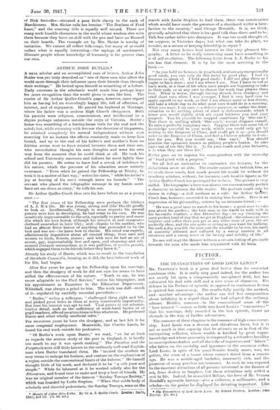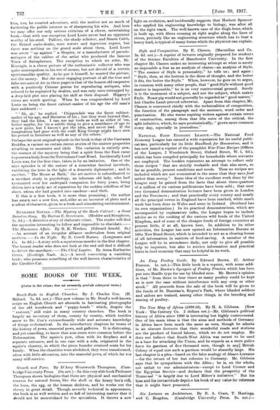FICTION.
THE TRANSACTIONS OF LORD LOUIS LEWIS.*
Mn. PERTWEES book is a great deal better than its somewhat cumbrous title. It is really very good indeed, for the author has not merely hit upon a comparatively unexplored field, but has cultivated his find with skill and a nice sense of character. His defence in his Preface of episodic as opposed to continuous fiction L3 spirited but unnecessary. The results fully justify the method, and—another advantage—the author can feel less compunction about indulging in a sequel than if ho had adopted the ordinary scheme. Besides, romance—in the conventional sense ofa this " love interest "—enters so little into Lord Louis's " transactions " that his marriage, duly recorded in the last episode, forms uo obstacle in the way of further adventures.
The romance of these chapters is the romance of high connoisseur- ship. Lord Louis was a devout and chivalrous lover, but it is not so much in that capacity that he attracts us as in that of the enterprising collector, whose wealth is fortified by great expert knowledge and whose generosity is tempered by a relentless hostility to unscrupulous dealers and all the tribe of impostors and " fakers " who fatten on the credulity and ignorance of the nouveaux riches. Lord Louis, in spite of his quasi-Semitic family name, was, we gather, the scion of a house whose coronet dated from a remote age. He was a middle-aged bachelor, immensely rich, and the possessor of many priceless art-treasures. As such ho was exposed to the constant attentions of all persons interested in the finance of art, from dealers to burglars, but those attentions only added a zest to life. Indeed, he resembled Bolsize, the hero of Mr. Vernon Renders agreeable fantasy—also a collector, a millionaire, and a scholar—in the genius he displayed for detecting imposture. Like • The Traneactions of Lord Louie 14-trie. By Roland Pertwee. London: John Murray. Ds. net.]
him, too, he courted adventure, with the motive not so much of furthering the public interest as of sharpening his wits. And here we may offer our only serious criticism of a clever, entertaining book—that with one exception Lord Louis never had an opponent worthy of his steel. Palliser, the shady solicitor, and Simon Caleb, the Bristol curio-dealer, were astute and ingenious rogues, but there was nothing on the grand scale about them. Lord Louis was never " up against " a Shapira, or a manufacturer of pseudo- antiques of the calibre of the artist who produced the famous Tiara of Saitaphernes. The exception to which we refer, Mr. Kineagie, is a clever picture of the enthusiastic collector who was quite unscrupulous in his use of means, but not devoid of a certain sportsmanlike quality. As he put it himself, ho wanted the picture, not the money. But the most engaging portrait of all the true and false servants of Art in those pages is that of the honest old carpenter with a positively Chinese genius for reproducing antiques, who refused to be exploited by dealers, and was only once entrapped by a deep-laid plot into placing his skill at their disposal. Higgery's views are worth quoting. When he was congratulated by Lord Louis on being the finest cabinet-maker of his age the old man's face saddened :—
Ah, sir,' he replied. ' Chippendale was the finest cabinet- maker of his age, and Sheraton of his ; but they went beyond that, they had the Idea. I can use my tools as well as either of 'em, bettor maybe, for 'tis a subtle thing to give a semblance of age to a now piece, but I haven't got the idea, and never had. If the imagination had gone with the craft King George might have seen his period in furniture as well as any of the others.' "
Perhaps the most original episode in the book is that of the Gautama Buddha, a variant on certain recent stories of the sinister properties attaching to mummies and idols The variation is entirely new, the essence of the mystery being that a spirit from the East came to possess a body from the Tottenham Court Road. Incidentally Lord Louis was, for the first time, taken in by an imitation. One of the nine episodes is of the nature of a somewhat farcical interlude, exhibiting the hero in the light of a domestic diplomatist ; and in another, " The House at Bath," the art-motive is subordinated to a mordant study in psychology, an inhuman old lady, who had tyrannized over her underpaid companion for forty years, being driven into a tardy act of reparation by the sudden rebellion of her slave, whom she had goaded into candour—and theft.
If this is a first book, it is more than promising ; the author has struck out a now line, and, alike as an inventor of plots and a student of character, given us a fresh and stimulating entertainment.



































 Previous page
Previous page